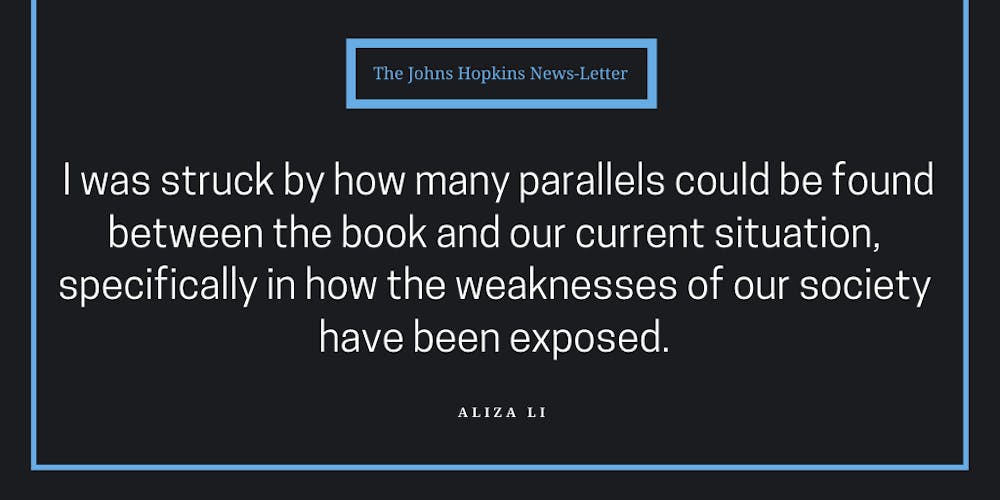Shen Fever is a fatal respiratory illness that disrupts the nervous system of its victims. Spread through fungal spores, the disease infects a person’s brain and effectively turns them into harmless, slowly-decaying zombies.
But don’t worry — it’s not real.
Shen Fever is the coronavirus (COVID-19) of Severance, a 2018 novel by Ling Ma that features a story eerily similar to the pandemic today. Like COVID-19, Shen Fever originated from China, requires public use of face masks and caused global havoc.
Before I began Severance, I expected the usual fare of post-apocalyptic stories: thrilling life or death situations and running from the flesh-eating undead. Or, perhaps something more focused on science and politics, like World War Z. However, upon reading the book, I was met with a very different spin on the end-times.
The novel certainly has moments of suspense as well as wry satirical humor, but Ma primarily uses her book to present an intimate and stark look at how human beings can decay both physically and emotionally.
Severance focuses on Candace Chen, a Chinese American in New York City who spends her days negotiating with frustrating clients as a publishing coordinator for biblical texts. The narrative alternates between present and past and builds the architecture of Candace’s life as a disillusioned workaholic clinging to old memories. Candace’s boyfriend breaks up with her when she is unwilling to move away with him and give up her corporate job. At this point in time, Shen Fever spreads, and as the number of infected people grows, millions leave New York while Candace stays. Eventually, she meets a group of survivors who are also immune to the illness and travels with them to a safehold dubbed “The Facility” by the group leader, Bob.
The story is rife with observations on human nature and the tendency for people to stick to their “safe” and comfortable routines. Much of Candace’s motivations surround the juxtaposition between her insistence on holding onto her job and the ease with which she drifts from place to place. She moves on from her parents’ deaths seemingly quickly (although they still remain in many of her thoughts) and refuses to leave New York with her boyfriend before the pandemic spreads. She spends years at her job despite never receiving her desired promotion to the Arts department.
When she meets the other survivors, she adapts quickly to their social structures but also begins to contemplate the emotional and mental changes she will need to make in order to survive. While she easily gives up social and emotional ties, she finds it difficult to let go of the comfortable aimlessness of work.
Like her, the zombies are sedentary, only moving to complete the menial routines they are perpetually stuck to until they die. The commentary on work culture can be quite on the nose, but the overall satirical elements of Severance present a poignant critique of capitalism. Trapped in the many turning cogs of the economic machine, what must one sacrifice and what must one endorse in order to survive? How does capitalism restrict all of us in inevitable, inescapable cycles?
Ma presents these elements through her characters and their various roles in society. Candace’s boyfriend rejects consumerism and corporate work to pursue art, a choice that falls flat of its moral when Candace internally points out the privilege and idealism in his actions. After all, the decision to abstain from participation in society is only available to those who can afford it. Candace’s more practical look at society reflects the opposite end of the spectrum — a complete submission to economic structures and a driven, task-oriented attitude.
While the other characters respond to Candace’s insistence on working during the pandemic with incredulity, Candace simply states that she has nowhere else to go and no one else to turn to, so working is the best outlet for her. By including this detail, Ma points out the way we have come to use work as both a scale of value and a survival mechanism.
Reading Severance and looking past the surface-level comparison of Shen Fever with COVID-19, I was struck by how many parallels could be found between the book and our current situation, specifically in how the weaknesses of our society have been exposed. The global pandemic has revealed systemic problems in our nation that many of us have been privileged enough to never understand until now — problems like the lack of social support programs allowing people to take medical leave from work to properly quarantine.
Severance exposes the issues in capitalism in a different manner, highlighting the kind of mental loopholes people jump through to rationalize participation in the system. Ma offers no solutions in her story; Candace’s actions at the end of the book fix neither their society nor herself. In this way, Candace is not condemned, but she also isn’t absolved. She represents the self-contradictory nature of existence and the kind of mental and emotional outpour that results when these contradictions meet.
Overall, I found Severance both enjoyable and thought-provoking and would definitely recommend reading it.





